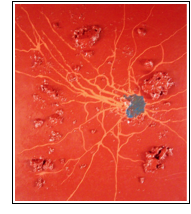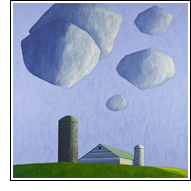 Le futur appartient à ceux qui voient les possibilités avant qu’elles ne deviennent évidentes. (Théodore Levitt)
Le futur appartient à ceux qui voient les possibilités avant qu’elles ne deviennent évidentes. (Théodore Levitt)
Ce n’est pas tant le réalisme que je cherche dans les discours futuristes, mais la vision de ce que les choses pourraient être, comme l’aube qui dessine les contours d’une île lointaine. La sentiment du but stimule l’action. Après le succès participatif de la conférence en ligne sur le connectivisme, George Siements rapplique avec une conférence sur l’avenir de l’éducation. The Future of Education Online Conference se tiendra du 4 au 8 juin. L’inscription est gratuite et permet d’assister et de participer aux présentations en mode synchrone. Il vaut mieux s’inscrire immédiatement, car on avait limité le nombre de participants lors de la première conférence.
Déjà, trois des cinq principales présentations sont connues : Technology and Higher Education — Pedagogy for self organised learning systems, Cultural Mutations et Knowledge beyond Authority. Cette dernière, surtout, clôturera merveilleusement la conférence. Par ailleurs, on ne voudra pas manquer la présentation de René Barsalo, de la Société des arts technologiques de Montréal, qui traitera des impacts des technologies de la communication sur la multiethnicité du tissu social, un sujet chaud dans le cadre du débat sur les accommodements culturels et des travaux de la Commission de consultation sur les pratiques d’accommodements reliées aux différences culturelles.
Ma première expérience de web-conférence avec Elluminate (rien à débourser pour les participants) a été un choc. Pendant que le conférencier fait sa présentation, les participants multiplient les commentaires dans un espace de discussion. En guise de comparaison, imaginez une conférence où tout le monde parle autour de vous pour saisir la difficulté à maintenir la concentration. Plutôt que de m’écartiller dans le multitasking, j’ai réalisé que le mieux était de me concentrer entièrement sur la présentation, puis de passer en revue le fil de la discussion à tête reposée, ou inversement si l’on veut participer à la discussion. Néanmoins, il faut apprécier la richesse d’un happening où tous les participants peuvent interagir et où l’on archive le flot des idées pour consultation ultérieure. À l’aube du connectivisme, nous sommes toujours contraints par les limites des technologies de la communication.
C’est, entre autres, l’occasion de découvrir la crème de la blogosphère éducationnelle anglaise, dont plusieurs Canadiens. Puisqu’il est question de multiculturalisme à l’ère d’Internet, il est grand temps d’élargir nos perspectives de l’éducation.
Mise à jour, 5 juin 2007 | Les présentations de la conférence The Future of Education sont accessibles en ligne. Ceci est un formidable ajout, considérant que tout le monde peut assister à la présentation en différé. Voici donc la liste chronologique des présentations (les présentations en gras sont particulièrement recommandées) :
• 2 juin 2007, Vicki Davis et Julie Lindsay; My seatmate lives in China: The Imperative for Global Collaborative Projects Abstract : “In days when the media polarizes nations, this high school teacher has seen greater cultural understanding and technical proficiency through Global Collaborative Projects such as the Horizon Project ( http://horizonproject.wikispaces.com) and the Flat Classroom Project (http://flatclassroomproject.wikispaces.com). Find out how its done, why its beneficial, and where she predicts such projects need to go in the future.”
• 4 juin 2007, Dave Cormier; Snowclones, Clichés and Memes : “This presentation will try to present an educational encounter from the future. While I’ve done my best to choose a topic that might be a little out of the mainstream, it inevitably will be familiar to some… image it being how communities are run in ten years time. The premise is that this is the sixth session in a series of live meetings in a community of practice that hopes to improve their understanding of using communities/networks for learning. I am the leader of today’s discussion. Take it as given that most of us have met before, that there is a record of the first five meetings, and that we have been using a variety of interactive tools to support and keep our learning, that we are all contributing funds to keeping our educational network supported, and that five different people have led the first five meetings.”
• 4 juin 2007, Dave Snowden; Snowclones, Clichés and Memes : “How do we balance the power of distributed learning and the « ever online » culture with the cognitive development needs of human systems? What is the role of community in education? How can use narrative as a knowledge management tool within on line learning? This session will apply learning from the cognitive sciences and complex adaptive systems theory to the field.”
• 5 juin 2007, Cheri Toledo; The Future of Teacher Education: Herding Cats and Chasing Targets : Teacher preparation will have a decisive impact on the future of education. Knowing this, numerous questions arise: What do prospective teachers need to know? How can teacher education programs prepare teachers to meet the needs of 21st and even 22nd Century learners? These and more questions will focus our discussion on an important aspect of the future of education.
• 5 juin 2007, Teemu Arina; Homo Contextus: connected human and the future of education : Contextus is Latin and it means « connected or weaved together ». In english we use the word context to describe the circumstances or setting in which an event occurs. I use Homo Contextus to describe a human who is growing, living, learning and breathing meaning through human or non-human contextual connections fueled by social technologies and driven by shared objects. Other words starting with « homo » have been used in recent times to describe humans living in the spirit of the age, or « Zeitgeist ». Homo ludens (the playing human), homo faber (instrument and engineering oriented human), homo aestheticus-informaticus (knowledge-intensive but experience-oriented human), homo creativus (the creative human), homo cyber (human of the technological future) and homo symbolicus (the symbol processing human) have all been used to grasp the changing nature of what it means to be human in modern times. In my talk I will weave together Homo Contextus the connected human with the future of higher education. Where are we going, what patterns do we see emerging and what needs to go? (Diapositives de la présentation; version PDF)
• 6 juin 2007, David Wiley; Openness and the Future of Education : This talk will discuss learning objects as representative of the current state of the art in educational technology, and then discuss how and why the idea of « openness » is the only viable future for this particular educational technology and for education generally.
• 6 juin 2007, Teemu Leinonen; Computerized, networked, free, open and oppressive education? : This talk will discuss about use of computers and networks in the light of oppression in education. There is a growing demand to have free and open educational resources, as well as computers and personal learning environments for each child in the world. Most production and delivery of free and open educational resource is not taking place in a two-way network. The content is emphasizing the superiority of rational-scientific-white-man living in a consumer culture. Are these universal goods or virtues what we all need? Researchers, designers and developers of education technology should ask: Who is educating whom? What is the education about? Why they (or we) are doing it?
• 6 juin 2007, Leigh Blackall; Open Educational Resources and Practices : In this talk I take a look at what constitutes an open educational resource and consider the issues and benefits to an educational institution. An institution which is moving to participate in open educational resource development and adopt more open educational practices. There is a description of the initial steps being made by the Educational Development Centre at Otago Polytechnic – a tertiary education and vocational training institution in Southern New Zealand. (Diapositives de la présentation)
• 7 juin 2007, MaryFriend Shepard; The Transformation of Learning in Universities through Online Education? : The role of online learning in universities is transforming the way adult learners are gaining access to educational experiences, whether through complete programs offered by online universities, or through individual courses and programs in F2F universities. Online education has become big business as a part of the technological revolution. This session will explore some of the strategies and best practices for successful online teaching and learning at the university level, as well as the challenges that are faced in this arena.
• 7 juin 2007, Jay Cross; Participatory Education : Education is empowered as never before. Web 2.0 connects people the world over and encourages active participation. Incoming students have no fear of technology and are self-reliant « entrepeneurial learners. » Let’s blend these elements and brainstorm the possibilities. What will globally interconnected education look like? David Snowden’s remarks on brain plasticity in children made me want to get every six-year old a phone pal with whom to speak another language. Each one teach one. Reflect on this, and come prepared to share your ideas.
(Image thématique : Future?, par Ffoeg)
Par ricochet :
Conférence en ligne sur le connectivisme
Survol de l’apprentissage et du connectivisme
Conférence / connectivisme : George Siemens
 Le futur a été créé pour être changé.
Le futur a été créé pour être changé. 







